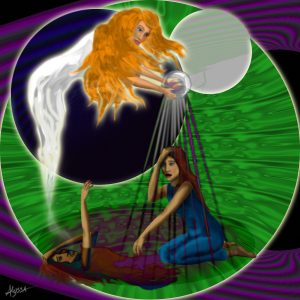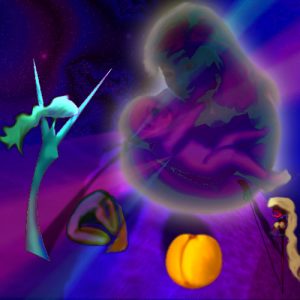I wrote the following in response to a very well-meant encouragement to adhere to the usual party line: that my a-parents loved me and cared for me and were my parents, not the genetic donors who are my b-parents. This was meant in kindness, for I had been sharing the difficult time I have been having parsing through my grief over my reunion with a grave and all the strangeness of feeling these emotions over someone I never even met. I was surprised at the passionate outpouring of my response, so I thought I would share it here as well.
** excerpt of response begins here **
Regarding my adoptive parents, please don’t feel that I harbor a great deal of anger toward them. It is simply not in me to cling to anger. You are absolutely correct in that I’m sure their position was that I was theirs from birth and that was that, and I don’t see any malice in it. Thoughtlessness and possibly arrogance, but not malice. There is also no point in supposing that my life with my biological parents would have been better or worse. It would have been different, that is all that can be known. My adoptive parents were 42 when I was born, and I was raised in a household more suited to the 40s than the 70s. My father was harsh and authoritarian and my mother was the compliant helpmeet. I was expected to grow up and be a housewife, and to that end I was not supported or encouraged to go to college or develop a career. When I left my husband my father started encouraging me to find another husband literally the day I moved out of our apartment, and years later got so incensed at my persistent singlehood that at one point he threatened to cut me out of his will unless I remarried. It was inconceivable to him that I would choose to remain single – to his way of thinking the whole point of women is to be married to men and so I clearly was Doing It Wrong.
Society’s narrative for the adoption story goes like this: the birth mother is the noble, self-sacrificing relinquisher doing what’s best for the baby and the adoptive parents are the noble, generous benefactors of the Poor Unfortunate. The adoptee is the loving, grateful beneficiary of mother’s sacrifice and adopters’ largesse. The reality, however, is more along these lines (especially for the millions of adoptions that occurred during the “Baby Scoop Era”, which my adoption solidly was): young unwed mother is shunted through a systematic maternity home/relinquishment path with virtually no options. She is usually scarred and grieving and offered little or no support for her trauma and loss. Infertile couples line up to adopt, to build families which the post-war burgeoning middle class held was the correct and conforming thing to do. Infertile couples were somehow suspect, considered lesser-than. In my own adoptive parents’ case, they both came from very large families (9 and 10 children) so the fact that my mother was only able to successfully carry and deliver one child must have been agonizing for them both.Then the entire adoption transaction was legally and socially sealed and hidden, to cover the shame of both infertility and bastardy. The adoptee was usually told, but often in the spirit of ‘this is a horrible secret that must never be discussed’. If my adoptive parents had told me as a child it would almost certainly have been in those terms, so I am glad they did not introduce what would inevitably have been an additional challenge to my sense of self-worth, already suffering from their attitude toward females in general.
I don’t mean to sound Dickensian about it all. Honestly I had a mostly pleasant and uneventful childhood and I accept that everybody’s decisions were logical and without malice. My adoptive parents assuredly loved me and I them. The grating thing is that the adoptee’s feelings or needs are never allowed first consideration, if they are allowed any consideration at all, and the birth family even less so. I had no participation in the decisions surrounding my adoption and was never given an opportunity to form an opinion, let alone have my needs considered, particularly should they be in conflict with anyone else’s. Even now, at 50 years old, I am to discard my own feelings about the situation in favor of everyone else’s. Even with my adoptive parents dead and gone, their feelings have precedence over mine. It is all well and good to support the accepted narrative, but if it were so cut and dried then why do most adoptees seek their birth families, and why do most birth families desire reunion? You say that my father gave me genes as if it was inconsequential, and yet I see now that I am far more like my birth parents than I ever was like my adoptive parents. You can’t imagine my relief in finding the many, many traits I have that were wholly unlike anyone in my family (my writing, my art, my interest in the arts generally) that have parallels in my biological parents. I never suspected I was adopted, but I also spent most of my life feeling like I just didn’t fit in and my interests and abilities were merely tolerated. I always ascribed that to the age difference, but I think the real reason is clear now.
As far as what effect my birth parents finding me might have had on my teen self, I don’t think it would have been bad and it would likely have been particularly good if they had been an influence to tell me it was good to want to develop myself, but it seems a waste of time and inviting more irreconcilable angst to think too much about it. I’ve given the matter of not being told a great deal of thought and my conclusion is that my parents should have told me (and my adopted brother) when we became adults. I think it is so strange that we can accept our innate ability to love multiples – children, siblings, cousins – but somehow it is believed that we are incapable of loving two mothers and two fathers. It feels to me like possessiveness in the truest sense of the word, of the individual themselves but even more of one’s position as “mother” or “father” – the only relationship in life that is expected to be so permanently singular. It seems to me that our discomfort bespeaks our inherent understanding that the accepted social narrative is very, very wrong.

